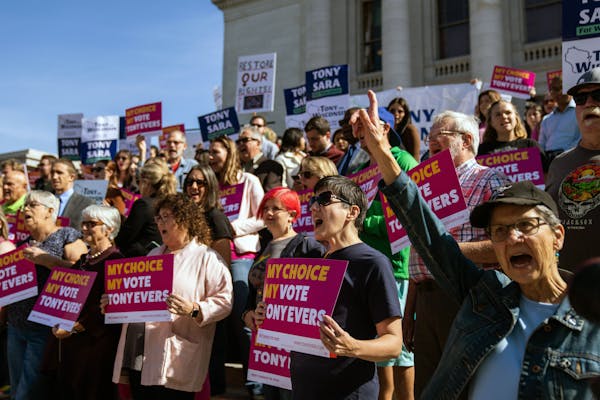Minnesota Democrats say they rode a wave of anger over the U.S. Supreme Court's reversal of Roe v. Wade into complete control of state government, giving them a clear directive from voters to enshrine abortion protections into state law.
Democrats' push will vault the issue to the forefront when lawmakers return to the Capitol in January after years of inaction under divided government. DFL House and Senate leaders say they have enough votes to pass abortion rights bills and send them to the governor's desk — likely for the first time in state history.
"This is a pro-choice state. Period. Full stop," said Minnesota Lt. Gov. Peggy Flanagan, who won re-election last week alongside DFL Gov. Tim Walz. "With a historic pro-choice trifecta in the Legislature, we aren't just on defense, we can proactively invest in policies and programs that improve people's care and improve people's lives."
Abortion opponents are already criticizing the agenda as "extreme."
"It's also out of step with Minnesotans who support commonsense protections for women and children, such as parental notification before abortions are performed on minor girls and protection for unborn children late in pregnancy," said Paul Stark, spokesman for Minnesota Citizens Concerned for Life. "We will work hard to see that this harmful effort does not succeed."
Minnesota doesn't have any laws on the books ensuring abortion access, but the state Supreme Court ruled in its 1995 Doe v. Gomez decision that the procedure is constitutionally protected, stating that women have a "fundamental right to reach a private decision on whether to obtain an abortion."
DFL leaders and abortion rights advocates said the reversal of Roe in the Dobbs v. Jackson case showed that the state could be a few Supreme Court justices from that access being taken away.
"We know that Supreme Court terms end. There's a mandatory retirement age for judges in Minnesota," said House Speaker Melissa Hortman, DFL-Brooklyn Park. "We will be working together to enshrine in law — as well as having in case law — protections that Minnesotans can count on going forward."
The Doe v. Gomez ruling has made Minnesota an exception in the region and, increasingly, a destination for women across the country seeking abortions. This summer, a Ramsey County judge also undid a handful of abortion regulations in the state, ruling that a 24-hour waiting period, parental notification for minors and other requirements were unconstitutional.
Hortman said she expects Democrats to look again at the Protect Reproductive Options Act, a proposal that would add to state law a "fundamental right to make autonomous decisions about the individual's own reproductive health," according to the bill's language. The legislation would also codify the right to privacy around reproductive health care decisions, while prohibiting discrimination against individuals for those choices.
The proposal didn't go anywhere last year in the Republican-led Senate or in the DFL-controlled House, where Hortman said Democrats at that point didn't have the 68 votes needed to go on "offense" to pass additional protections for abortion.
Over the years, many rural Democrats who opposed abortion retired or lost their races. She now believes there are 69 votes in her caucus in favor of abortion access, thanks in large part to victories for Democrats in suburban districts.
"There was a vocal rage for the two weeks after that Dobbs decision came out, but there was a simmering rage that did not stop," she said.
Republicans in the House and newly cast into the minority in the Senate have been quiet on the issue in the immediate aftermath of the election. On the campaign trail, Republicans pointed to polling indicating that voters were more concerned about the economy and rising crime, and they said they wouldn't push to change constitutional protections for abortion if they won power.
"We are definitely going to have those conversations to see where we want to head," said Rep. Lisa Demuth, R-Cold Spring, shortly after she was elected to lead the House Republican caucus last week. "We are a pro-life caucus and so we are going to maintain that."
Proposals to expand or codify abortion access didn't get a hearing in the GOP-led Senate over the last six years. But Democrats unexpectedly reclaimed control in the chamber by a single vote in what was expected to be a wave year for Republicans.
"Choice is the reason we are in the majority," said incoming Senate Majority Leader Kari Dziedzic, DFL-Minneapolis, adding that voters at the doors asked "specifically pointed questions about, 'where are you on choice?'"
"People were concerned that their rights are being rolled back and they wondered what's next," she said. "That was always at the forefront."
Neither DFL leader would dive into specific proposals yet, including whether the party is considering putting an abortion-related constitutional amendment on the ballot in 2024. In Minnesota, both chambers can put a question to voters on the ballot with a simple majority vote.
In last week's election, states such as Michigan, Vermont and California successfully moved to enshrine abortion protections in their constitutions.
One day after the election, outgoing DFL Senate Minority Leader Melisa López Franzen, who did not seek re-election, deferred to her colleagues on whether they should take that step next year. But she signaled her own support for putting abortion protections in the constitution: "That would probably be the most important way to do that."
Former DFL Senate Majority Leader Kari Dziedzic dies of cancer at age 62

How the Star Tribune is covering the 2024 election

Fact check: Walz and Vance made questionable claims during only VP debate

In Tim Walz's home city, opposing groups watch him debate on the national stage

